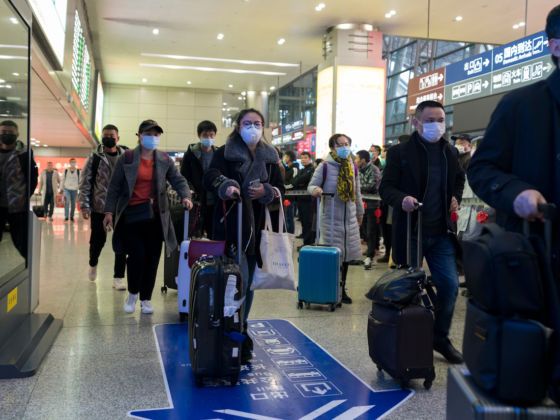COVID-19, commonly known as the coronavirus, has added a major concern to the minds of travelers since its initial detection in late December. Now that the cases have spread from China to countries around the globe, questions about travel insurance policies are increasingly top of mind. While coverage and exclusions vary on a case-by-case basis, here’s a general overview of what to expect from your travel insurance provider, should you be visiting an impacted area or need to cancel travel plans.

How the Coronavirus Is Impacting Travel Insurance Policies
The basics of travel insurance and coronavirus
As of late February, there are no specific exclusions for coronavirus in any major travel insurance policy outside of China. However, factors such as government travel restrictions, pre-existing conditions, and the proliferation of a global pandemic can all exclude a traveler’s eligibility for coverage on claims filed due to the coronavirus. This means that should you travel somewhere where a restriction is in place, you are likely not eligible to file a claim. It also suggests that purchasing a travel insurance policy after contracting the virus, or even after visiting a place where the virus is prevalent, also excludes eligibility.
Two general rules of thumb to keep in mind surrounding travel insurance: First, if there has been a Level 3 Travel Warning issued by the US Center For Disease Control and Prevention for a specific destination within the past six months, claims filed for cancellation, sickness, or emergency assistance are generally not covered. The same is true if a Level 3 warning is issued while you are in that location if you fail to leave within 10 days. For example, any travel to Wuhan, China, is unlikely to be covered for at least six months following the end of a Level 3 restriction, and a traveler who was in Wuhan for more than 10 days following the January 23 declaration is unlikely to be covered.
Second, natural disasters, pandemics and endemics, and public health emergencies are generally not covered by travel insurance, even if they happen once you’ve already arrived. This is amplified when the World Health Organization has issued a travel restriction or the US Center for Disease Control and Prevention has issued a Level 3 warning, which cautions to avoid all non-essential travel.
For travel to and from Europe

Photo: Paolo Bona/Shutterstock
Travel insurance providers have not, as of late February, defined a specific exclusion for the coronavirus as it relates to travel in Europe. The WHO and CDC have issued their highest-level travel advisories for China and South Korea, but no restrictions have been issued for Italy, Spain, or any of the other countries with confirmed cases. Therefore, COVID-19 is currently treated as any other sickness that a traveler may contract while abroad. But factors such as pre-existing conditions still apply, and should a travel warning be issued, failure to evacuate a country or location where a warning has been issued within 10 days will likely exempt a policy from being able to file a claim. If you purchased an insurance policy before traveling to Europe, and your travel plans do not include travel to or from China, you may be eligible to file a cancellation claim or request emergency assistance, depending on your specific policy.
Should the virus proliferate and trigger additional restrictions or make conditions notably unsafe in a place where you have confirmed travel, travel itineraries and insurance policies purchased prior to late December may have a higher chance of success with cancellation or other claims filed. This is because the coronavirus had not yet been covered extensively in the media nor had it spread outside of China, likely saving the traveler from any fault in needing to cancel.
For travel to and from China
Given that the United States and other countries have issued top-level travel restrictions to China, odds of having treatment for COVID-19 covered if you visit anytime soon are slim. World Nomads, a leading travel insurance provider, states on its website: “Any policies that may offer coverage associated with contagious disease will no longer cover claims arising from any event related to coronavirus (2019-nCoV) for travel to and/or from China on policies purchased after 1:00pm CST on January 22, 2020.”
The statement goes on to clarify that should you already have been in China prior to that date, you are not eligible for coverage unless you contract the illness and are quarantined because of it. In this case, you may be eligible for emergency medical and cancellation coverage.
According to insubuy.com, travelers who had visited Hubei province before the Level 3 warning was issued on January 23, and who left the city within 10 days afterward, may be eligible for sickness coverage on a case-by-case basis. Visitors arriving after January 23 are not eligible for coverage on most policies.
Should you have to travel to China for family or emergency reasons before the outbreak is fully contained and travel insurance providers reinstate coverage for contagious diseases, take precautions such as wearing a mask, washing hands frequently, and avoiding areas where the disease is prevalent.
What if I traveled to a country with confirmed cases, and purchased coverage once there because I felt sick?

Photo: cpt.kama/Shutterstock
If this is the case, you’d better hope that sickness wasn’t COVID-19. Travel insurance providers are generally not responsible for pre-existing conditions, particularly anything that happened prior to the dates specified in the policy as they correlate with the locations specified in the policy. So, if you purchased insurance for a trip to Thailand in March, your insurance covers — to the extent listed in your policy — what happens in Thailand in March. Should you add an extended layover in Hong Kong on your way without adding to your coverage prior to arrival, you’re probably out of luck.
While you could argue that since no symptoms were shown until after your arrival in Thailand and that you may have contracted it at the airport in Bangkok, the insurance provider is likely going to request your full travel itinerary from the time you left home. They’ll see that stop in Hong Kong, and your case may be gone with the wind.